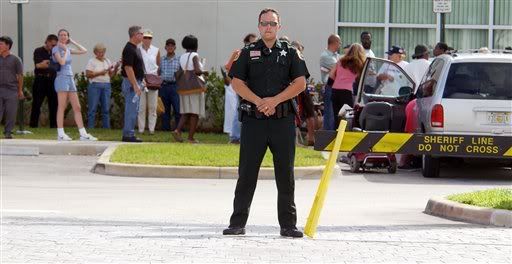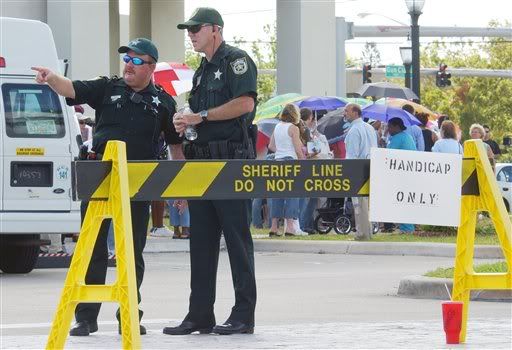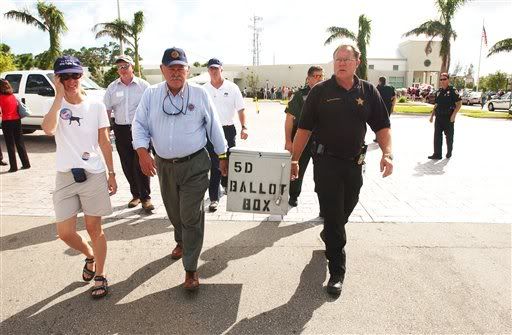segunda-feira, novembro 01, 2004
Police arrests journalist for photographing voters
Jane Daugherty Palm Beach Post
A widely published investigative journalist was tackled, punched and arrested Sunday afternoon by a Palm Beach County sheriff's deputy who tried to confiscate his camera outside the elections supervisor's headquarters.
About 600 people were standing in line waiting to vote early when James S. Henry was charged with disorderly conduct for taking photos of waiting voters about 3:30 p.m. outside the main elections office on Military Trail near West Palm Beach.

A Palm Beach police officer stands guard keeping the media and non-voters away from the people standing in line to vote early Monday, Nov. 1, 2004, in West Palm Beach, Fla. People waited on line for hours to cast their vote. (AP Photo/J. Pat Carter)
A sheriff's spokesman and a county attorney later said the deputy was enforcing a newly enacted rule from Elections Supervisor Theresa LePore prohibiting reporters from interviewing or photographing voters lined up outside the polls.
But the arrest drew expressions of outrage from a leading Florida civil liberties expert — and even from one of LePore's fellow county election supervisors.
When Deputy Al Cinque tried to grab Henry's camera, Henry ran about 100 feet across the pavement on the side of the elections office before he was tackled by the deputy.
Cinque yelled at Henry, "Hold still, stop moving," after he pinned Henry on the pavement, punched him in the back and grabbed Henry's left arm to put a handcuff on his wrist.
Cinque then jerked Henry, 54, to his feet by his left arm and slammed his body against a parked car, where the deputy punched him again as Henry tried to hand him identification cards that were later found on the pavement.
A widely published free-lance journalist, as well as a Harvard-educated lawyer and economist, Henry has written for The New York Times, The Washington Post, U.S. News and World Report and The New Republic.

Police officers keeps the media and non-voters away from the people standing in line to vote Monday, Nov. 1, 2004 in West Palm Beach, Fla. at the county election headquarters. Strict security measures are in place. (AP Photo/J. Pat Carter)
According to his Web site, www.submergingmarkets.com, he is working on "an election-year book, due out this fall, that explores how the U.S. is falling behind the rest of the democratic world, including countries like Brazil and South Africa, with respect to the practice of electoral democracy."
Asked why Henry was being arrested, Cinque said, "You're not allowed to take pictures of voters."
Henry repeatedly told the deputy: "I'm a journalist. I'm a journalist doing my job."
A Palm Beach Post reporter and British journalist Marcus Warren, of the London Daily Telegraph, witnessed Henry's arrest. So did dozens of waiting voters.
Sheriff's spokesman Paul Miller said that before being transported to the Palm Beach County Jail, Henry was examined by paramedics when he complained of shoulder pain. Henry has been charged with disorderly conduct and resisting arrest without violence, Miller said.
"We're not going to let anyone interfere with the orderly conduct of the elections process here," Miller said.
LePore refused to come to the main desk of elections headquarters to comment on the arrest. She did not return later calls for comment.
One of LePore's peers, Leon County Elections Supervisor Ion Sancho, called restricting reporters and photographers on public sidewalks outside polling places "an outrage. I'm shocked. The First Amendment right to be there is absolute.
"Outside our early voting place we had Japanese journalists, the BBC, all kinds of reporters and photographers," added Sancho, who is based in Tallahassee. "It's a public place, a public sidewalk. There is no statute, no law that can take away your right to talk to someone who is willing on a public sidewalk as long as no one is obstructing or interfering."
Howard Simon, executive director of the Florida chapter of the American Civil Liberties Union, also called Henry's arrest an outrage. "Where did Theresa LePore get the authority to criminalize activities protected by the First Amendment?"

Unidentified election officials carry a empty absentee ballot collection box back to the drop off point at the county election headquarters in West Palm Beach, Fla., Monday, Nov. 1, 2004, as people stand in the long line, far rear, waiting to vote early. (AP Photo/J. Pat Carter)
Henry was one of the original "Nader's raiders" who worked decades ago with consumer advocate Ralph Nader, and was vice president for strategy for IBM/Lotus before he founded the Long Island-based Sag Harbor Group, a consulting firm that focuses on technology strategy. He has continued his investigative reporting career at the same time, in 2004 publishing The Blood Bankers, a book reporting on "dirty banking" in developing countries. The book includes an introduction from former U.S. Sen. Bill Bradley.
The Rev. George Wilson, a Presbyterian minister from Long Island, N.Y., who accompanied Henry to West Palm Beach Sunday morning, said Henry was interested in touch-screen voting in Palm Beach County and had arrived to observe the process.
"We flew down this morning," Wilson said. "I can't believe they're treating him this way. He was just standing there taking pictures.
"When did taking photographs outside in a public place become a crime?"
Wilson retrieved Henry's Minolta camera with a large lens from the top of the trunk of the parked car after Henry was put in a sheriff's car.
Assistant Palm Beach County Attorney Leon St. John, who represents the elections supervisor, said Henry had been charged with disorderly conduct, a misdemeanor, based on LePore's instructions to deputies.
He said the charge against Henry was based on new rules LePore implemented Friday, prohibiting reporters from talking to or photographing voters while they are in line outside the polls. He said she made the rule as the result of "numerous complaints by voters about being photographed and interviewed."
However, The Post and other newspapers and television stations had previously interviewed and photographed voters in line without incident since early voting began Oct. 18. LePore did not mention any new restrictions on interviews and photographs during a meeting with news media representatives Friday.
As for Henry, St. John said: "From what I understand, this man (Henry) was taking photos of people in line close up. He was ordered by the deputy to stop and to move to the media tent...
"He said something inappropriate to the deputy, like 'screw you,' then took a picture of the deputy. He then took off running and tripped and fell in the parking lot."
In fact, Cinque tackled Henry in the parking lot a few feet from a Post reporter and Warren, the British journalist.
"That's not what the deputy told me," St. John said.
LePore spokesman Marty Rogol described Henry as "a so-called investigative reporter who gave people phony credentials."
Told that Henry had been published in The New York Times, The Washington Post and other publications, Rogol said Henry had presented "Xeroxed credentials that looked phony and were not accepted" by the deputy who arrested him.
Late Sunday, Miller said Henry "will probably spend the night in jail." He was still there late Sunday night on $500 bail.
A widely published investigative journalist was tackled, punched and arrested Sunday afternoon by a Palm Beach County sheriff's deputy who tried to confiscate his camera outside the elections supervisor's headquarters.
About 600 people were standing in line waiting to vote early when James S. Henry was charged with disorderly conduct for taking photos of waiting voters about 3:30 p.m. outside the main elections office on Military Trail near West Palm Beach.

A Palm Beach police officer stands guard keeping the media and non-voters away from the people standing in line to vote early Monday, Nov. 1, 2004, in West Palm Beach, Fla. People waited on line for hours to cast their vote. (AP Photo/J. Pat Carter)
A sheriff's spokesman and a county attorney later said the deputy was enforcing a newly enacted rule from Elections Supervisor Theresa LePore prohibiting reporters from interviewing or photographing voters lined up outside the polls.
But the arrest drew expressions of outrage from a leading Florida civil liberties expert — and even from one of LePore's fellow county election supervisors.
When Deputy Al Cinque tried to grab Henry's camera, Henry ran about 100 feet across the pavement on the side of the elections office before he was tackled by the deputy.
Cinque yelled at Henry, "Hold still, stop moving," after he pinned Henry on the pavement, punched him in the back and grabbed Henry's left arm to put a handcuff on his wrist.
Cinque then jerked Henry, 54, to his feet by his left arm and slammed his body against a parked car, where the deputy punched him again as Henry tried to hand him identification cards that were later found on the pavement.
A widely published free-lance journalist, as well as a Harvard-educated lawyer and economist, Henry has written for The New York Times, The Washington Post, U.S. News and World Report and The New Republic.

Police officers keeps the media and non-voters away from the people standing in line to vote Monday, Nov. 1, 2004 in West Palm Beach, Fla. at the county election headquarters. Strict security measures are in place. (AP Photo/J. Pat Carter)
According to his Web site, www.submergingmarkets.com, he is working on "an election-year book, due out this fall, that explores how the U.S. is falling behind the rest of the democratic world, including countries like Brazil and South Africa, with respect to the practice of electoral democracy."
Asked why Henry was being arrested, Cinque said, "You're not allowed to take pictures of voters."
Henry repeatedly told the deputy: "I'm a journalist. I'm a journalist doing my job."
A Palm Beach Post reporter and British journalist Marcus Warren, of the London Daily Telegraph, witnessed Henry's arrest. So did dozens of waiting voters.
Sheriff's spokesman Paul Miller said that before being transported to the Palm Beach County Jail, Henry was examined by paramedics when he complained of shoulder pain. Henry has been charged with disorderly conduct and resisting arrest without violence, Miller said.
"We're not going to let anyone interfere with the orderly conduct of the elections process here," Miller said.
LePore refused to come to the main desk of elections headquarters to comment on the arrest. She did not return later calls for comment.
One of LePore's peers, Leon County Elections Supervisor Ion Sancho, called restricting reporters and photographers on public sidewalks outside polling places "an outrage. I'm shocked. The First Amendment right to be there is absolute.
"Outside our early voting place we had Japanese journalists, the BBC, all kinds of reporters and photographers," added Sancho, who is based in Tallahassee. "It's a public place, a public sidewalk. There is no statute, no law that can take away your right to talk to someone who is willing on a public sidewalk as long as no one is obstructing or interfering."
Howard Simon, executive director of the Florida chapter of the American Civil Liberties Union, also called Henry's arrest an outrage. "Where did Theresa LePore get the authority to criminalize activities protected by the First Amendment?"

Unidentified election officials carry a empty absentee ballot collection box back to the drop off point at the county election headquarters in West Palm Beach, Fla., Monday, Nov. 1, 2004, as people stand in the long line, far rear, waiting to vote early. (AP Photo/J. Pat Carter)
Henry was one of the original "Nader's raiders" who worked decades ago with consumer advocate Ralph Nader, and was vice president for strategy for IBM/Lotus before he founded the Long Island-based Sag Harbor Group, a consulting firm that focuses on technology strategy. He has continued his investigative reporting career at the same time, in 2004 publishing The Blood Bankers, a book reporting on "dirty banking" in developing countries. The book includes an introduction from former U.S. Sen. Bill Bradley.
The Rev. George Wilson, a Presbyterian minister from Long Island, N.Y., who accompanied Henry to West Palm Beach Sunday morning, said Henry was interested in touch-screen voting in Palm Beach County and had arrived to observe the process.
"We flew down this morning," Wilson said. "I can't believe they're treating him this way. He was just standing there taking pictures.
"When did taking photographs outside in a public place become a crime?"
Wilson retrieved Henry's Minolta camera with a large lens from the top of the trunk of the parked car after Henry was put in a sheriff's car.
Assistant Palm Beach County Attorney Leon St. John, who represents the elections supervisor, said Henry had been charged with disorderly conduct, a misdemeanor, based on LePore's instructions to deputies.
He said the charge against Henry was based on new rules LePore implemented Friday, prohibiting reporters from talking to or photographing voters while they are in line outside the polls. He said she made the rule as the result of "numerous complaints by voters about being photographed and interviewed."
However, The Post and other newspapers and television stations had previously interviewed and photographed voters in line without incident since early voting began Oct. 18. LePore did not mention any new restrictions on interviews and photographs during a meeting with news media representatives Friday.
As for Henry, St. John said: "From what I understand, this man (Henry) was taking photos of people in line close up. He was ordered by the deputy to stop and to move to the media tent...
"He said something inappropriate to the deputy, like 'screw you,' then took a picture of the deputy. He then took off running and tripped and fell in the parking lot."
In fact, Cinque tackled Henry in the parking lot a few feet from a Post reporter and Warren, the British journalist.
"That's not what the deputy told me," St. John said.
LePore spokesman Marty Rogol described Henry as "a so-called investigative reporter who gave people phony credentials."
Told that Henry had been published in The New York Times, The Washington Post and other publications, Rogol said Henry had presented "Xeroxed credentials that looked phony and were not accepted" by the deputy who arrested him.
Late Sunday, Miller said Henry "will probably spend the night in jail." He was still there late Sunday night on $500 bail.